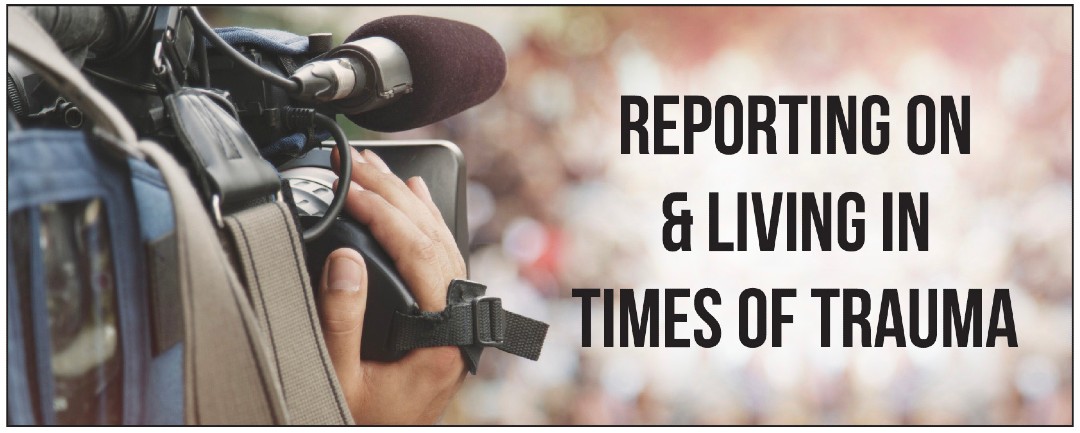Lehigh’s department of journalism and communication; the Office of Diversity, Inclusion and Equity; and the Africana Studies program will co-sponsor ‘Reporting on and Living in Times of Trauma,’ a two-day virtual program for all members of the Lehigh community that will facilitate reflection and conversation about the impact of everyday trauma and pain.
Both panels will include advice from psychologists about how to maintain mental health in the midst of these types of trauma. Jennifer Midberry, assistant professor of journalism and communication; Mariana De Maio, assistant professor of journalism and communication and Latin American and Latino Studies; and John Vilanova, professor of practice in journalism and communication and Africana Studies, will serve as moderators.
On Tuesday, March 23, from 4:30 to 6 p.m., a panel of award-winning journalists and a psychologist will discuss “Reporting on Times of Trauma.” Panelists Jim MacMillan, founder and director of the Philadelphia Center for Gun Violence Reporting; Cassie Owens, staff reporter at The Philadelphia Inquirer; and Elana Newman, McFarlin Professor of Psychology at the University of Tulsa and research director for the Dart Center for Journalism and Trauma, will discuss the effect of vicarious trauma on journalists, including student journalists, and how journalists can care for their own mental health. Participants can register at this link.
“Obviously all of our students at Lehigh are experiencing trauma, but since our students are student journalists, there's a whole extra layer of trauma or stress, and so this first day of the panel is really aimed at helping them understand that, that they are experiencing not just their own trauma but vicarious trauma by covering stories about other people's experiences during the pandemic,” says Midberry. “The first panel is hopefully going to really provide information for them to see and understand that journalists are classified as first responders. They experience vicarious trauma, and there is an extra burden on mental health, but there are also things that they can do to maintain their mental health.”
The session on Wednesday, March 24, from 4:30 to 6 p.m., will focus on “Living in Times of Trauma.” Panelists Danielle Kilgo, the John & Elizabeth Bates Cowles Professor of Journalism, Diversity and Equality at the University of Minnesota; Kareem Johnson, associate professor of psychology at Temple University; and Stephanie Shiffler, postdoctoral resident at Lehigh’s Counseling and Psychological Services, will discuss lived experiences of witnessing mediated trauma and its impact on day-to-day life, particularly for Black Americans. Participants can register at this link.
“There's also, in addition to the pandemic, another layer of stress that our Black students and students of other minority communities are experiencing,” says Midberry. “And we just wanted to give space to that, to help to normalize that and help them understand that and recognize and name that extra stress, and then to help our white students understand that this is that extra level of stress that your peers are experiencing and how you can be sensitive to that.”
The idea for the two-day program developed when faculty in the department of journalism and communication shared with one another their experiences teaching in Fall 2020.
“We all have anecdotes and observations of major stress that we noticed in our students, and we just wanted to be responsive to that,” says Midberry.
Midberry, De Maio and Vilanova wanted to give students in their department an opportunity to focus on personal wellness. As they planned the program, they realized that the discussions would benefit the wider Lehigh community.
“We thought that it would be important to give the students some kind of a break even though there was not a spring break—a time to reflect on wellness, in a way,” says De Maio. “We started thinking about it just for the journalism department, but as we were planning it we thought that this is something that may be of interest for all students, particularly the second day, where we're going to be talking about this traumatic experience by students of color and how we can understand that in a different way.”
A goal of the two-day conversation, says Vilanova, is to communicate to students and to the wider Lehigh community that “it’s okay to feel as if this year was not normal because it’s not.”
“One of the things that mattered to me personally was just not over-normalizing this,” he says. “This is still a very strange, uncertain, unsettled surreality. We didn't sign up for this and our students and community didn't sign up for this. And so we wanted just to make a space where there could be that type of frankness where we can remind people that if they don't feel okay, they're not alone, particularly if the pandemic’s ongoing intersections with racism, sexism, ableism and economic precarity have touched their lives.”
The organizers hope that participants will come away from the sessions with ideas and actions they can take to foster their own mental health.
“The idea is to not just talk about the issue [of trauma] but to leave these two days of discussion with some tips on how to deal with it in a more concrete way,” says De Maio.
For more information, visit the event site.


